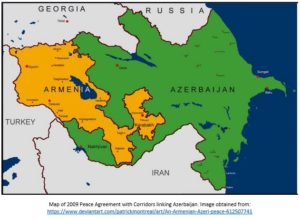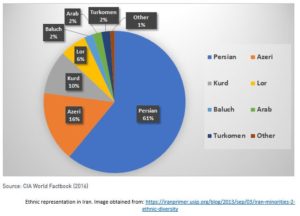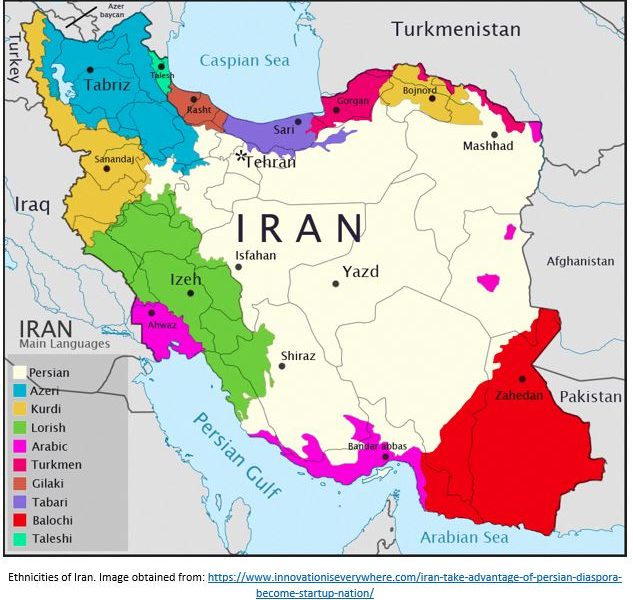Today’s Featured Article, or in this case Podcast, goes back several days to a John Batchelor interview with Russell Berman of the Hoover Institute. As we try to catch up from the long weekend and shake off all of the tryptophan induced sluggishness, check out the other candidates for our featured article on the Homepage in the What Others are Writing Section on the sidebar. The other two articles that come in for honorable mention are: Nigeria massacre: number shoots up to at least 110 – Africa News (hopefully, I can get a dedicated post to this) and Iraqi Kurds Turn Against the PKK – Foreign Policy, I will forever have a soft spot for news in Iraq. Once again, there are so many great stories out there, so, if you haven’t already done so, head over to the front page to keep tabs on what is going on around the world.
Why This is Important
Iran is near the top of the U.S. adversary list and understanding more about the make up of that country will only help in understanding what motivates them beyond the overly simplistic headlines. Iran is comprised of a diverse group of ethnicities with competing interests that may create space for exploitation and internal instability.
Featured Podcast
Last week, I listened to this podcast (embedded below) from the John Batchelor Show where he interviews Russell Berman with the Hoover Institute about the Russian Peacekeepers in Nagorno-Karabagh. This is the Armenia-Azerbaijan conflict that has been raging for almost six weeks. There is no question that this is a very complicated map and they do a great job at summarizing the conflict and why it is important. But I wanted to use this post to talk about a single line that Mr. Berman threw out: “Iran is full of ethnic minorities and the plural majority of Persians is decreasing.” Originally I heard this as ‘Iran has a plurality of minorities’ which was incorrect…I had to re-listen to the podcast but it got me thinking about an article last week in the Asia Times – Armenia-Azerbaijan peace deal a strategic disaster for Iran and what the make-up of Iran is and why was Iran supporting Armenia in this conflict? So before we jump into the ethnic make-up of Iran lets first go the Asia Times to find out why this peace deal is so bad for Iran:
The terms of the ceasefire in the Nagorno-Karabakh conflict agreed between Armenia and Azerbaijan represent a grave threat to Iran’s long-term strategic interests. The effects of this are likely to influence the Iranian people’s perception of their regime, as well as alter Iran’s policy toward Azerbaijan and Syria.
Azerbaijan now is in control over the entirety of its border with Iran along the Aras River. While this may be a cause for celebration in Baku, it is viewed with alarm in Tehran. This is because an extension of Azerbaijan’s border with Iran will give Israel access to more territory from which to keep tabs on Tehran.
Here is our overly simplistic recap of a centuries old dispute to help clarify things on this difficult map: The recent Armenia-Azerbaijan conflict is over the disputed territory of the Nagorno-Karabagh region that was declared as part of Azerbaijan after the fall of the Soviet Union, voted for some level of autonomy and was occupied by Armenian forces following a bloody war in the 1990s. Turkey and Israel generally support Azerbaijan and Russia and Iran generally support Armenia. The U.S. and Europe appear to be confused by the complicated map and don’t want to pick a side. We have written more in-depth about it here and here. The following two maps illustrate what Armenia lost and why this is bad for Iran.

Back to the Asia Times for a description of the corridor:
The other consequence of the war is the creation of a transit corridor across Armenian territory that will connect Azerbaijan to its Nakhchivan exclave. To be manned by Russian troops, this corridor likely will run parallel to Armenia’s border with Iran.
Here is an older map depicting that corridor.

So why is a corridor manned by Russian troops bad? The Times article continues:
This has already raised concern in Tehran as it could in effect cut off Iranian access to Armenia and onward to Europe via Georgia. For a country already reeling from international sanctions, it is of great importance for Iran that it is able to gain access to friendly neighbors.
All of this demonstrates the diminished influence Iran has in the region as the Asia Times wraps up with this:
The main effect of how the conflict has played out on domestic politics within Iran is likely to be psychological. This is yet another blow to Iran’s self-image as a regional hegemon. Indeed, that Tehran was a bystander to the conflict and was unable to have a say in shaping the outcome will revive memories of the two Russo-Persian Wars of the 19th century, which resulted in Persia having to cede its control over the entire South Caucasus.
It reveals to the Iranian people that Iran no longer has the economic might, technological sophistication or alluring political model to influence a region that was under Persian influence for hundreds of years – one is tempted to say thousands of years, since the time of the Achaemenid empire.
The reference to domestic politics brings us back to the John Batchelor Show Podcast that was the genesis for this post and the statement, “Iran is full of ethnic minorities and the plural majority of Persians is decreasing.” So what is the ethnic make-up of Iran? For that we will go to this article from The United States Institute of Peace: Iran Primer (emphasis mine).
Persians are Iran’s largest ethnic group, but nearly a dozen other ethnicities represent well over a third of the 79 million population. The largest ethnic groups, which are major factors in Iranian politics, are Azeris, Kurds, Arabs, Baluchis, and Lors. Others include Turkomen, Qashqai, Mazandarani, Talysh and Gilaki. They hold dozens of seats in the current parliament…
…ethnic minorities are a sensitive political issue, which is one reason accurate numbers in politics and the military are not easily available. The Islamic Republic prefers to emphasize religion to foster national identity and avoid problems of ethnic divisions. Many politicians do not discuss their ethnicity, although several Azeri, Kurdish, Baluchi, and Arab groups have expressed frustration with Tehran.
And what would that frustration be? The article highlights several points:
- Lack of government spending on development in provinces with large ethnic minorities,
- Revenues from oil and natural resources in their regions being spent on other cities and provinces,
- Greater regional autonomy,
- And limits on use of their traditional languages.
I think one could easily add a lack of Azerbaijani support in the latest conflict to the list given they are the largest minority group within Iran and the whole point of this post. Iran is made up of a large number of minority groups that, if not properly represented, could lead to instability within Iran. The Armenia-Azerbaijan conflict and the ensuing peace deal could have effects beyond their borders disproportionately hurting Iranian interests.

The Armenia-Azerbaijan conflict has always been a bit confusing and sorting out the allies there even more so as they do not follow ethnic or religious lines. In trying to understand the conflict, I have read quite a few articles and listened to various podcasts and have came away with a general feeling that most support Azerbaijan in this fight and not Armenia. This is particularly true for the John Batchelor Show and the Foundation for the Defense of Democracy (FDD) with FDD being an important voice in Washington and Foreign Policy in general. I have always wondered why they seemed so heavily in favor of the Azerbaijan side in this conflict and the strategic disaster for Iran goes a long way in explaining that.
In summary, Iran is a vastly more diverse country that I thought and the results of the Armenia-Azerbaijan conflict have damaged the economic interests in Iran by further limiting Iranian access to Europe, further exposed them to an avowed adversary in Israel and potentially created a domestic dispute by their lack of support for their largest ethnic minority Azeri population. If one was looking for internal pressure points to foster instability there, this short list would be a good place to start.
As promised, here is the podcast that sent us down this road.

